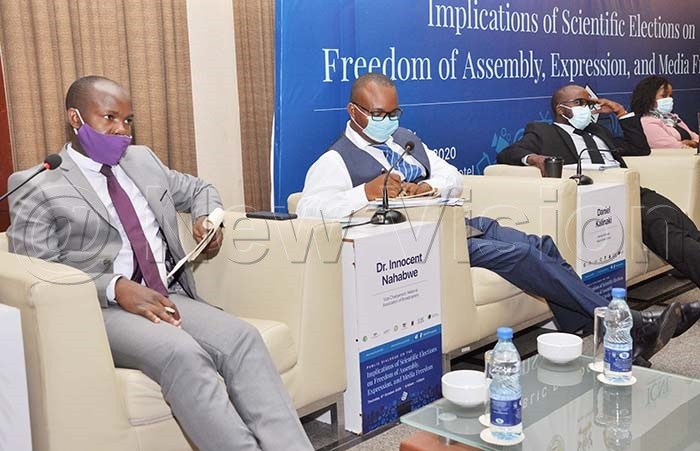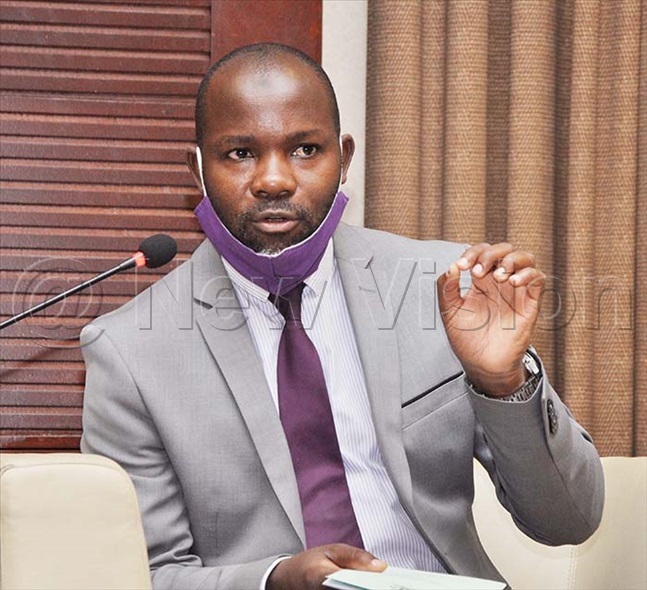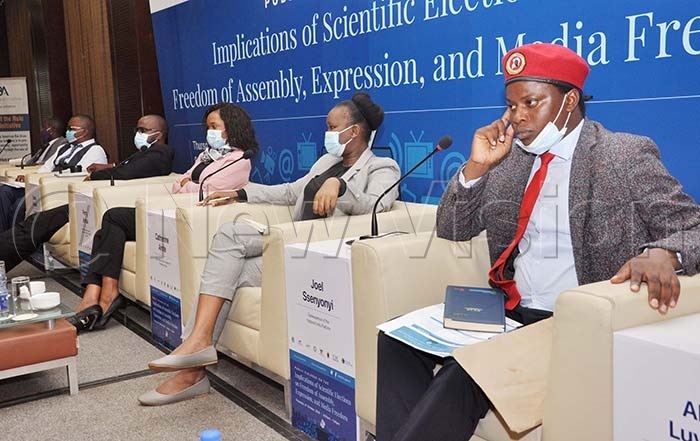EC cautions Police, RDCs on denying opposition leaders access to radios
Tashobya said politicians have a right to access radios and talk to the people as long as they do it within the confines of the law.
ELECTION WATCH|MEDIA|FREEDOM|POLICE
KAMPALA - The Electoral Commission has urged police and Resident District Commissioners (RDCs) to restrain from blocking opposition leaders from accessing radio stations.
Police and RDCs have in the past been at the center of stooping opposition leaders like Robert Kyagulanyi and Dr. Kizza Besigye from appearing on some radio stations to talk to Ugandans.
During a public dialogue on Implications of Scientific Elections on the Freedom of Assembly, Expression and Media Freedom which was convened on Thursday at Serena Hotel, various participants castigated the Electoral Commission for doing nothing when opposition politicians are denied access to radio stations.

The coordinator of Elections Management for the National Unity Platform for western Uganda Harris Akampulira raised concern that several attempts by Robert Kyagulanyi to appear on radio stations in western Uganda have been frustrated by security agents.
"With such incidents, how can the Electoral Commission assure that the NUP presidential candidate, Robert Kyagulanyi, will have equal space on media platforms like President Yoweri Museveni. Reports about 2016 elections indicated that President Museveni had more media coverage than all other candidates combined," Akampulira stated.
Kampala based lawyer, George Musisi sought to know whether the Uganda Communications Commission (UCC) had issued any sanctions against radio stations that deny opposition candidates access.
Responding to such concerns, the Electoral Commission commissioner, Stephen Tashobya, told the participants that they have had engagements with police and RDCs to ensure such incidents don't happen again.
"We have told them that the politicians have a right to access radios and talk to the people as long as they do it within the confines of the law," Tashobya explained.

Making reference to a court case in which Uganda Broadcasting Corporation was faulted for having denied Dr. Kizza Besigye access to their platforms in 2016 elections and the Supreme Court directives from the Amama Mbabazi election petition, Tashobya said they don't expect such mistakes to be repeated in the 2021 polls.
Tashobya also implored the political actors to notify them whenever they are denied access to some radio stations that they can undertake the necessary action.
On why the Electoral Commission has not petitioned the government to suspend Over the Top Tax (OTT) which limits the number of Ugandans accessing online media platforms yet media platforms will be the main avenue of campaigning, Tashobya said, "We have petitioned the government on OTT. But we can only stop at making proposals. The power to impose or remove a tax lies with parliament."
UCC legal officer, Abdul Waiswa, explained that whereas they would not take action against any radio for denying opposition politicians access if they don't receive formal complaints from the aggrieved.
Several participants also raised on the absence of a Communications Tribunal which is proved for in the UCC Act of 2013 which makes UCC to act as the complainant, prosecutor and the judge on matters of professional misconduct.

Responding to the concern, Waiswa said, "As UCC we are eager to have the tribunal to avoid those accusations. We have engaged so many stakeholders to have the tribunal constituted but we have limits. The tribunal is supposed to be constituted by the president."
The Executive Director of Freedom of Expression Hub, Catherine Anite, noted that in October 2019, UCC made directives to some media houses to suspend coverage of Robert Kyagulanyi which she said was a violation of media freedom.
Anite made reference to various international reports on press freedom which indicated that media freedom in Uganda has been declining for the last five years.
The coordinator of the Editors Guild, Daniel Kalinaki, argued that considering the fact that politics in Uganda is highly commercialized, scientific elections will favour those with money to buy media space to reach out to voters.
Indicating that only 16% of media coverage for 2016 general elections was allocated to women politicians, Perry Aritua, the Executive Director of Women's Democracy Network, implored the media to give more coverage to women in the 2021 elections.